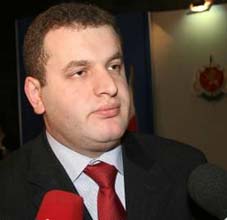Incident prevention meeting held in Gali
By Mzia Kupunia
Thursday, July 30

The Head of the Georgian Interior Ministry’s Analytical Department, Shota Utiashvili, who represented Georgia at the meeting, said the main subject of the talks was to ensure the secure movement of ethnic Georgians in Gali between the breakaway region and Zugdidi, a town on the administrative border between de facto Abkhazia and Georgia. “Ethnic Georgians living in the Gali region should not have to go to Zugdidi through Russian checkpoints and get permission from Russian border guards,” Utiashvili said after the meeting.
Maxim Ghvinjia, the de facto Abkhazian Deputy Foreign Minister, told journalists that the Abkhazian side had raised the issue of releasing David Sigua, a member of the Gali district civil administration, who according to him was “kidnapped” by Georgian special services in February 2006. “There is still no information about the location of this person,” Ghvinjia noted. In response to Georgian side’s claims about the border detention of a bus carrying ethnic Georgians to Zugdidi Gvinjia said the passengers did not have their documents in order.
Johan Verbeke, the Special Representative of the UN Secretary General, said that there are issues remaining on which agreement cannot be reached. “However the fact that the conflicting sides are sitting at the negotiating table is already a step forward,” Verbeke said.
The decision to hold regular meetings between the Georgian, Russian and de facto authorities and observer missions was taken on July 1, at the sixth round of Geneva talks. The first meeting was held on July 14 in Gali, the next is scheduled to be held in two weeks.
Meanwhile, Russia has handed materials describing the events of August 2008 in Georgia to Heidi Tagliavini, the head of the Georgian-Russian war fact finding commission. According to the Russian Foreign Ministry the materials included information on the political, judicial and military aspects of the events of last year. Tagliavini arrived in Moscow on Tuesday. As part of her visit to Russia she met representatives of the Russian media and the people interested in the Russian-Georgian conflict behind closed doors. Meanwhile the Deputy Head of the international fact finding commission, Uwe Schram, has visited Georgia. He held a behind closed doors meeting with Georgian journalists on July 24 to introduce his vision of how the commission will work in Georgia. Schram is a former German Ambassador to Georgia.
The decision to set up the international August war fact finding commission was taken on December 2008 by the European Commission. The mission was due to submit its final report to the European Commission by the end of July, however the deadline has been extended for two months. Tagliavini said that the issuing of the report was delayed due to additional materials being handed in by the parties to the conflict. “The analysis of these materials requires additional time,” the head of the international commission said.
